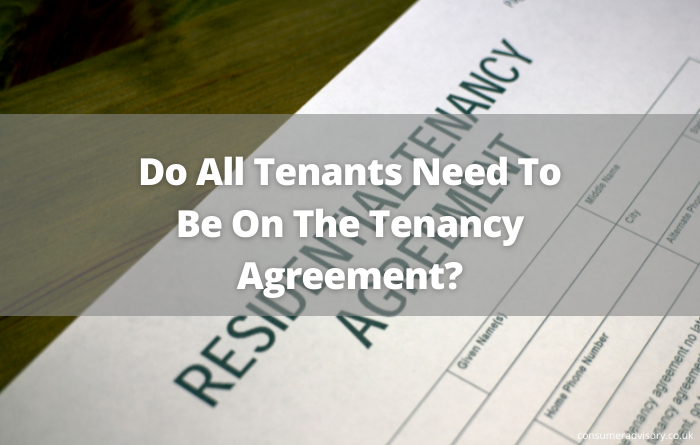The Tenancy Agreement can be confusing – especially if your landlord is new to the rental business.
Do all tenants need to be on the tenancy agreement? The mortgage and insurance provider may require this by law, therefore it is in the landlord’s best interest to do so. With this is mind, the tenancy agreement should be signed by the landlord and all tenants. All tenants, including joint tenants, should receive a copy of the agreement.
Before you move into a rental property, it is important to carefully review the tenancy agreement. This document outlines the rights and responsibilities of both the landlord and the tenant, and it should be signed by all parties before occupancy.
Within a rented property If there are multiple tenants on the lease, each individual should receive a copy of the agreement. In the event that any disputes arise, the tenancy agreement can serve as an important reference point. By signing the agreement, you are acknowledging that you have read and understood the terms of the lease. Taking this step can help to ensure a smooth and hassle-free rental experience.
Tenancy agreements
A tenancy agreement is a document that defines the terms under which one party (the landlord) leases property to another party (the tenant). It also outlines what each of the parties rights and responsibilities are. A tenancy agreement can be verbal or written, but it must have certain information in order to be legally binding on both parties.
It’s good practice for a written tenancy agreement to include the following details:
- Name: Your name and the landlord’s name, as well as the address where you are renting out your property.
- The date the tenancy began is generally shown on your lease.
- Are guests allowed on the property? Is there a list of tenants and who is permitted to use which rooms?
- The length of the tenancy – if it’s a fixed-term agreement, this refers to the end date of the term.
- What can I do if my landlord refuses to accept a revised offer? What options do I have if they don’t agree with the changes you propose? How much rent is due, how often and when it should be paid, and how often and when it may be increased are all factors to consider.
- What’s included in the rent – for example, council tax or energy bills
- If your landlord offers any services, such as laundry, maintenance of common spaces, or meals, and if there are service fees for these services,
- The amount of time you and your landlord must give to end the tenancy is determined by law, which specifies how much notice you must be given and this will vary depending on the type of tenancy and why it’s ending.
A lease may also clarify your landlord’s responsibilities to maintain the property. The obligations of your landlord to maintain the home will be determined by the sort of tenancy you have. Check your lease agreement to see if you have more rights than the legal minimums.
Tenancy agreement changes and transfers
When an apartment or housing association offers accommodation, it is required that a tenant’s agreement must be approved before settling the case. The agreement describes the actions agreed to by tenants to be carried out during their tenures in the property in question.
Sole tenant & Joint tenants
If you rent together, your rights will differ according to who is named in the rental agreement. Having married people and a civil union gives you greater rights even when your name is not in the tenancy agreement.
The tenant agreement is a document that defines the terms under which one party (the landlord) leases property to another party (the tenant). It also outlines what each of the parties rights and responsibilities are. A tenancy agreement can be verbal or written, but it must have certain information in order to be legally binding on both parties.
Changing the tenancy agreement
Typical tenants can only change their agreements with their landlord. Depending on where both parties agree on something, the change is recorded in written form. Your landlord can ask you to change the terms of the lease. They will not refund your money until you ask for a change. The landlord may charge the landlord for the change they did not demand but he will refund the money or report this to Trading Standards. Alternatively, they could offer a better solution by consulting with a financial adviser.
What rights do I have if I don’t have a tenancy agreement?
Whether you are renting or extending on your own property without a valid tenant agreement, you cannot assume responsibility. However, if one of your partners has left your property it is likely that your landlord will take rent payments for you when they leave and may even give you the option to transfer your lease to you. If your marriage has broken down you may want to talk to your landlord to find out why your spouse has attempted to end the contract.
Why landlords might prefer all tenants to be on the tenancy agreement
Some landlords may prefer all tenants to be on the tenancy agreement in order to ensure that everyone is aware of their responsibilities and is held accountable for their actions. This can help to avoid any misunderstandings or disagreements between tenants, and can also help to protect the landlord from any damage or missed rent payments.
How to terminate a tenancy agreement early
If either the private landlord or tenant wishes to end the tenancy agreement early, they must do so in accordance with the terms of the agreement. The landlord must give the tenant at least 2 months’ notice in writing, and the tenant must give the landlord at least 1 month’s notice. If either party fails to do this, they may be liable
Landlords often prefer all tenants to be on the tenancy agreement as this can help ensure that everyone is aware of their responsibilities and held accountable for their actions. However, some landlords may be happy to have just the main tenant or leaseholder sign the agreement, as they are ultimately responsible for rent and any damage to the property.

